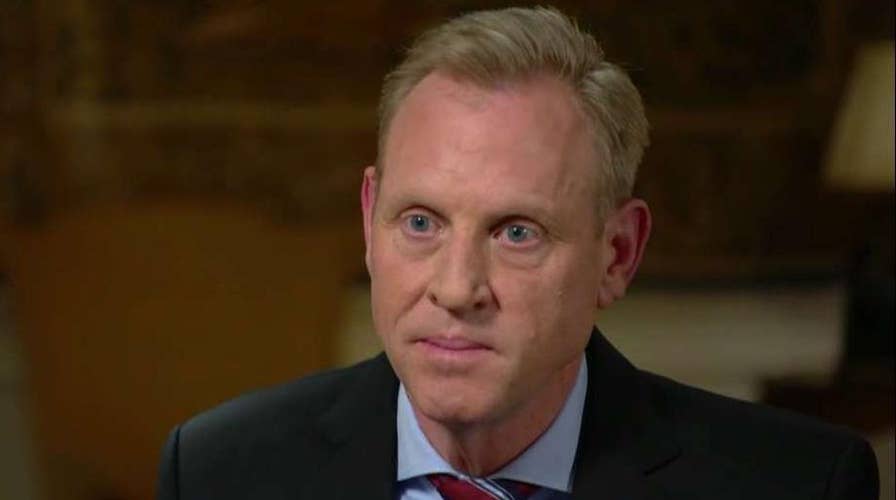Shanahan: The best possibility for peace in Afghanistan is at hand
Acting Defense Secretary Patrick Shanahan discusses U.S. military strategy.
After 40 consecutive years of bloodshed, ethnic strife, and insurgency, Afghanistan is finally approaching the gates of peace. While a semblance of normality is still very much out of reach, there is no disputing the fact that the ongoing peace talks between the United States and the Taliban are a genuine and serious diplomatic process that could eventually lead to fruitful results.
To date, the discussions have largely centered around the U.S.-centric goals of preventing Afghanistan from reverting back to a transnational terrorist utopia and creating the space necessary for a deliberate, safe and orderly U.S. military withdrawal from the country.
Eighteen years into a war that has severely eroded U.S. popular support. Washington appears to have finally come to the logical conclusion that Afghanistan’s problems will not be resolved through the force of arms or by the capable hands of the U.S. military.
If pummeling the Taliban into submission and killing top insurgent leaders was the solution to the systemic issues Afghanistan confronts, the country would have ceased to be one of the most violent regions on the planet long ago.
The problems bedeviling Afghanistan today — widespread insecurity; extensive graft and corruption across all levels of society; limited job opportunities; poor government services; and ineffective political leaders often detached from the wider Afghan population — cannot, and will not, be resolved or even addressed by foreign military forces.
'TALIBAN FIVE TRADED FOR BOWE BERGDAHL AT CENTER OF AFGHANISTAN PEACE TALKS
While the months-long peace negotiations are promising, they have yet to involve any serious interaction between Afghans themselves. The Afghan government is only now in the process of building an inclusive negotiating team, an effort that may require time-consuming and heated discussions between all Afghan stakeholders.
The Afghan government remains on the outside of the diplomatic process looking in, although the war will continue to rage for as long as the tough but fundamental questions about Afghan political power-sharing, the rights of women and minorities, and the Afghan constitution are avoided.
What's needed now is significant buy-in and participation from a wide cross-section of Afghan society, including vulnerable communities such as the Hazaras, who have been brutalized and targeted by the Taliban. Without this, the peace talks being shepherded by U.S. Ambassador Zalmay Khalilzad will likely turn out to be nothing more than a short-term alleviation of the violence.
Americans have become disillusioned with the unhealthy and downright counterproductive tendency to use the U.S. military as a crutch for every problem in the world.
The Trump administration appears committed to the task of redeploying U.S. troops out of Afghanistan and terminating what has long been the longest war in American history. Ultimately, this is an objective everyone in Washington should share.
The American people are tired of sending their sons and daughters in uniform into hopeless, unwinnable situations that result in little gain to America’s broader national security interests. The endless military deployments over nearly a generation, and the spending of obscene amounts of money that is misused, misallocated, or wasted on ill-conceived projects, including nearly $1 trillion in Afghanistan, must come to an end.
Americans have become disillusioned with the unhealthy and downright counterproductive tendency to use the U.S. military as a crutch for every problem in the world. It happens too often at the expense of other aspects of America’s enormous national power.
Whatever the exact structure and framework a potential U.S.-Taliban agreement takes, the talks themselves will at least provide a much-needed reminder to the Washington policy community of the power, influence, and ability of America’s extraordinarily capable diplomats to face considerably difficult problems head-on.
Will the Afghan peace process result in a long-term political accord that actually sticks, one that is inoculated against the inevitable spoilers on the ground who are opposed to any compromise? This remains very much an open question. With so much going on behind closed doors, those of us who are not in the negotiating room simply don’t know where this entire process is headed or what its final destination will be.
What we can say with reasonable certainty, however, is that the process won’t amount to much if Afghan society, most notably the government in Kabul, remains shut out of the discussions or is not afforded the opportunity to become the main protagonist in the effort. Khalilzad and his team know it, which is why they have encouraged President Ashraf Ghani to form an inclusive and balanced negotiating team as quickly as possible.
Fortunately, that effort is now in the process of coming to a conclusion. On April 7, Ghani announced a reconciliation committee that would choose a delegation and monitor the talks’ progress.
Better late than never, the development is an absolute prerequisite if intra-Afghan negotiations are to begin. It is not the responsibility of the United States to resolve the political, economic, and social issues for the people of Afghanistan — only Afghans possess the capacity, knowledge, and incentives to do it.
CLICK HERE TO GET THE FOX NEWS APP
So at the same time Washington continues to discuss the modalities of a military drawdown — one welcomed after 18 years of sacrifice in blood and treasure — it must also send a clear and unequivocal message to the Taliban that while U.S. diplomats are more than happy to discuss counterterrorism assurances and possible cooperation against groups like Al Qaeda and the Islamic State, they will not be taking ownership of the political issues.
Nor will U.S. diplomats serve as surrogates at the table for the Afghan government. If the Taliban wants to discuss its future status in a post-U.S. Afghanistan, it must speak directly with the Afghan government-appointed delegation.
While America will continue to support the Afghan people, it should not stand in the way of Afghanistan reclaiming full independence and sovereignty over its own affairs.

